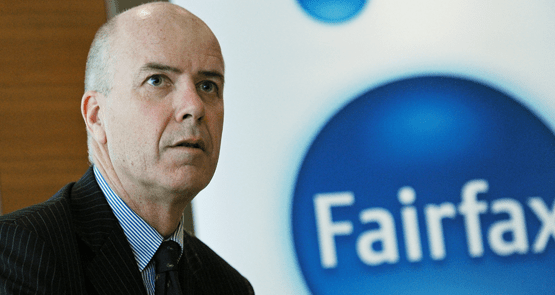
When Fairfax’s union journalists went on a wildcat strike last Thursday, CEO Greg Hywood, who oversees an organisation that has aggressively cut journalist jobs during his tenure, said a further 120 redundancies were necessary for the business.
“We are operating in an ever-changing highly competitive media environment which involves rapid evolution of our publishing model. The initiatives we have proposed today are part of that adaptation and are necessary to sustain high-quality journalism.”
But Fairfax’s CEO wasn’t always so willing to adapt to the times.
In 1980, 2124 members of the Australian Journalists’ Association went on strike for five weeks to protest against the introduction of “visual display terminals” (computers) in newsrooms.
The Australian Journalists’ Association, as it tended to do during long strikes, started a strike paper, The Journalists’ Clarion, issues of which were produced in each state. The Melbourne copies of it are notable for its bylines, the most intriguing of which is that of one Greg Hywood from the Financial Review …


Hywood appears several times in the seven issues published.
The Clarion was filled with ads of organisations in support of the strike. Its editorials extolled the strike’s virtue and provided information to readers and journalists about the latest developments.

The journalistic articles had a heavy focus on industrial issues, particularly the negative effects of VDUs …


Apart from Hywood, another familiar name was that of business guru and editor Alan Kohler, who wrote on Friday that the market would decide the size of Fairfax’s newsrooms. Also contributing were a heavy-hitters Robert Gottliebsen, Anne Summers, Michael Gordon, Mark Baker, Laurie Oakes, Greg Baum, Wendy Harmer, Julianne Schultz, Peter Coster, Mike Sheahan and Michael Gill, who’d go on to be a Fairfax exec. Crikey reads in the Monthly that Andrew Bolt was also on strike in 1980, though, alas, his name isn’t in the Clarion. He has been a critic of the strikes, which on the weekend he wrote were “a crazy response to an unrealistic aim”.








Greg Hywood was a terrific publisher of the AFR when i was there. Who knows what the pressures are on him?
Easy enough to automate clickbait ‘articles’ based on what’s trending on twitter.
Get some Uni interns to knock out some domain features based on Industry press releases and you’ve got 80% of the fairfax content covered.
I’m far too young to have met the Luddites, but have encountered numerous Latter Day Luddites in many industries.
One of the few totally secure positions these days must be that of Crikey Censor?
There’s a song for the likes of Hywodd, sunbg to the tune of the Internationale, “the working class, can s my arse, I got the foreman job at last!”
… sorry, on an ancient, sick XP machine, my laptop having been stolen.
That would be “…the likes Hywood, sung to the tune of the Internationale “the working class can kiss my arse…”